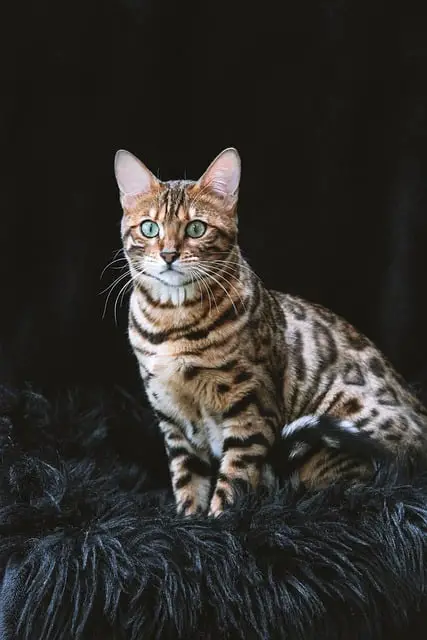When a mother cat loses all of her kittens, it can be a heartbreaking experience for both the cat and her owner. But what does a mother cat do if all her kittens die?
While the answer may vary depending on the individual cat and the circumstances surrounding the loss of her litter, there are some common behaviors that mother cats may exhibit in this situation.
Mother Cat’s Behavior
When a mother cat loses all her kittens, it is a heartbreaking experience for her. She may exhibit various behaviors as she processes her grief and tries to cope with the loss. Here are some common behaviors that a mother cat may display in this situation.
Grieving Process
Like humans, cats can experience grieving when they lose a loved one. When a mother cat loses her kittens, she may become withdrawn and lethargic.
She may spend more time sleeping and less time grooming herself. She may also lose her appetite and become less interested in playing or interacting with her human family.
Searching for Kittens
Another behavior a mother cat may exhibit after losing her kittens is searching for them. She may wander around the house, meowing and looking for her babies.
She may also return to the place where she gave birth and spend time there as if hoping to find her kittens.
It is important to note that not all mother cats will exhibit these behaviors after losing their kittens. Some may seem to bounce back quickly and return to their normal routines.
However, suppose you notice any concerning changes in your cat’s behavior after a loss. In that case, it is always a good idea to consult your veterinarian to ensure she is healthy and well-cared for.
Physical Changes
When a mother cat loses all her kittens, several physical changes occur within her body. These changes are a natural response to the loss and can vary depending on the individual cat.
Milk Production
One of the most noticeable physical changes is a decrease in milk production. The mother cat’s body recognizes no longer any kittens to nurse, which begins to slow down milk production. If not addressed, this can result in engorgement, discomfort, and even mastitis.
To help alleviate these symptoms, the mother cat may need to have her milk manually expressed or receive medication from a veterinarian. It is essential to monitor her closely to ensure that her milk production does not become a health issue.
Uterine Contractions
Another physical change that occurs after the loss of all her kittens is uterine contractions. These contractions are the body’s way of expelling any remaining tissue and fluids from the uterus.
The mother cat may experience discomfort during this process, and it is not uncommon for her to be lethargic or have a decreased appetite. Providing her with a quiet, comfortable space to rest and recover during this time is essential.
Sometimes, a veterinarian may need to intervene if the mother cat experiences complications while expelling any remaining tissue and fluids.
Overall, providing the mother cat with proper care and attention is essential during this difficult time. By monitoring her physical changes and providing any necessary medical intervention, you can help her recover and move forward.
Health Concerns
Mastitis
When a mother cat loses all of her kittens, it can cause a lot of stress on her body. One potential health concern is mastitis, an infection of the mammary gland.
This can occur when the milk inside the gland becomes stagnant, and bacteria begin to grow. Symptoms of mastitis include swelling, redness, and warmth in the affected area.
The cat may also experience pain when the area is touched or when she is nursing.
If left untreated, mastitis can lead to abscesses, which are pockets of pus that form in the gland. In severe cases, the infection can spread to the bloodstream and cause sepsis.
Treatment for mastitis typically involves antibiotics and draining any abscesses that have formed. The mother cat may also need to stop nursing temporarily to allow the infection to heal.
Infection
Another potential health concern for a mother cat who has lost all of her kittens is infection. This can occur if the mother cat has open wounds or bacteria enter her body through her reproductive system. Signs of infection include fever, lethargy, loss of appetite, and discharge from the vagina.
If a mother cat shows signs of infection, she should be taken to a veterinarian immediately. Treatment may involve antibiotics, fluids, and supportive care to help her recover.
It is essential to monitor the mother cat closely after she has lost her kittens to ensure that she stays healthy and recovers from any potential health concerns.
Conclusion
In conclusion, when a mother cat loses all her kittens, she may have a period of mourning and confusion. However, she will eventually move on and may even become pregnant again. Cat owners must provide emotional support and care for their feline companions during this difficult time.
Some key takeaways from this article include:
- Mother cats may experience grief and confusion when their kittens die and may exhibit behaviors such as searching for their offspring or becoming withdrawn.
- Cat owners must provide support and comfort for their mother cats during this time, such as offering extra attention and affection.
- In some cases, mother cats may become pregnant again shortly after losing their kittens and may require extra care and attention during their pregnancy and nursing period.
Overall, it is essential to remember that mother cats are intelligent and resilient animals, capable of adapting to difficult situations. They can recover from losing their kittens and live happy, healthy lives with proper care and attention.
[su_box title=”Affiliate Disclosure”]This website is supported by its readers. Please assume that all links are affiliate links. If you make a purchase from one of the links we will make a commission from Amazon. Thank you.[/su_box]




